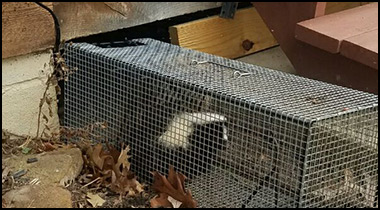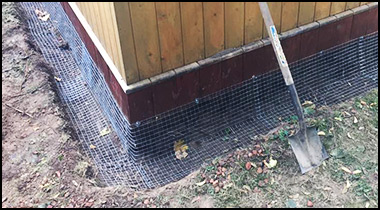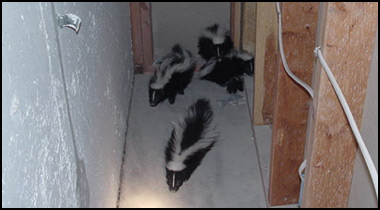Providence Skunk Removal Resources
Skunk Rehabber - Wildlife Rehabilitators Association: (401) 294-6363
Free Providence County Animal Services: (401) 273-0358
Humane Wildlife Trappers of Providence: 401-223-4430
If you need skunk control in Providence, you have a few options. First, you can attempt to solve the skunk problem yourself by reading our do-it-yourself guide. If you need outside help, you can also call Providence County Animal Services to see if they have any free resources or help for you - however, they primarily deal with dog and cat concerns. You can also call a local Providence wildlife rehabber, as they are typically a great resource for advice that is in the best welfare of the animal. If as a last resort you must hire a professional company, we recommend Humane Wildlife Trappers of Providence at 401-223-4430. To learn more about them or check their skunk removal prices, visit providencepestanimal.com.

Providence Skunk Trapping and Removal

Preventative Repairs & Exclusion

Providence Skunk Removal From Structures
In many cases, preventative measures can solve your Providence skunk problem - keep garbage secured, pet food indoors, and most of all when it comes to skunks, secure the perimeter of your shed, porch, deck, or house with a barrier - lattice or steel mesh is good, and it keeps Rhode Island skunks from going under the structure. If trapping and removal of the skunk is the only option you have, please do so with the help of a local agency or professional company who knows how to do it humanely and legally. Browse the resources of this site for more educational information.
Frequently Asked Questions:
Prevention: How to Keep Skunks Away
What to do with a skunk after I catch it?
Is it legal for me to trap a skunk?
How to remove skunk odor
Is a skunk active during the daytime rabid?
What does skunk feces look like?
Providence Skunk Control Information: What is a skunk's natural diet?
Skunks are known to be opportunists animals and they will eat smaller creatures while they use the spray as effective self-defense method but they are not equipped with skills to fight or to kill. This is why they make it simple and only target the prey that will not oppose them. When there is no small prey, they will stick to the diet they get from foraging.
Even if the skunk may look as nuisance to the humans, they are beneficial to the humans in some ways. They will kill pests like cockroaches, scorpions, black widow spiders and snakes. According to the research, at least 70 percent of the diet of the skunk is made up with the insects which are harmful to the people.
Even if the skunk diet is mostly based on the insects, they can also eat helpless and small animal prey. They will eat rabbits, voles and field mice. The skunks can also eat the eggs or the flightless young of the ground nesting birds. Other prey may be amphibians, reptiles and fish.
Even if the skunk will like to eat animal diet, sometime the animals are not that plenty in winter or fall. During the cold months, skunk can turn to plant based diet besides eating small prey or insects when they find them. They can forage for berries, grapes, cherries and corn. They will go for the foods that are already at the ground since they are accessed easily. They will be eating crops and rotting fruits which humans may not eat.
Skunks are not that picky when it comes to what they eat and they will take everything they can lay their hands on. They will also look into the garbage if it is left unattended. Refuse bins are a home for insects, rotting food and rodents and they will rummage within these garbage or dumpster to get food. They will look for the food in the compost piles, outdoor grills and bird feeders and this leads to conflict between pets and humans.
For someone who has a skunk as a pet, he has to make sure that he gives it a balanced diet with low fat. You can give it human quality food and no grain dog food. If it is still young, you should give it vegetables, poultry, bread or cereal, crushed raw nuts or cooked grains. It is important to monitor the skunk so that it does not grow too thin or too fat
Remember, for free services you can try (401) 294-6363 or (401) 273-0358, but if you need to pay for professional help, check the prices at the providencepestanimal.com website. Or follow our do-it-yourself guide!

